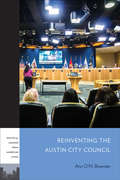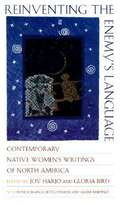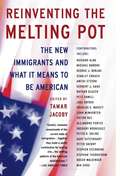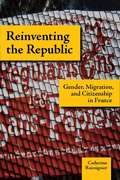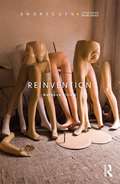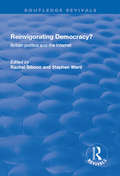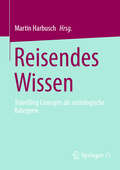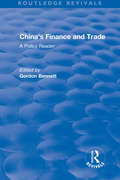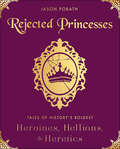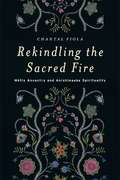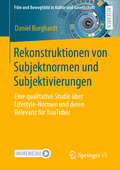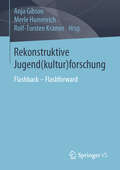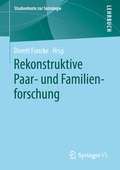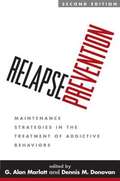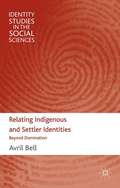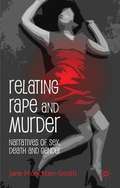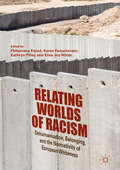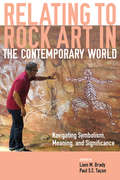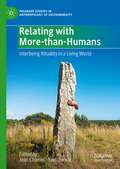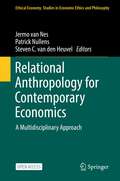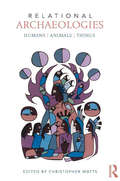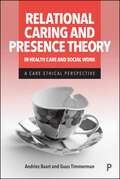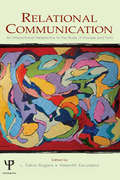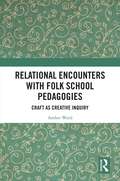- Table View
- List View
Reinventing the Austin City Council (PLAC: Political Lessons from American Cities)
by Ann O'M. BowmanUntil recently, Austin, the progressive, politically liberal capital of Texas, elected its city council using a not-so-progressive system. Candidates competed citywide for seats, and voters could cast ballots for as many candidates as there were seats up for election. However, this approach disadvantages the representation of geographically-concentrated minority groups, thereby—among other things—preventing the benefits of growth from reaching all of the city’s communities. Reinventing the Austin City Council explores the puzzle that was Austin’s reluctance to alter its at-large system and establish a geographically-based, single-member district system. Ann Bowman chronicles the repeated attempts to change the system, the eventual decision to do so, and the consequences of that change. In the process, she explores the many twists and turns that occurred in Austin as it struggled to design a fair system of representation. Reinventing the Austin City Council assesses the impact of the new district system since its inception in 2014. Austin’s experience ultimately offers a political lesson for creating institutional change.
Reinventing the Enemy's Language: Contemporary Native Women's Writings of North America
by Joy Harjo Valerie Martínez Beth Cuthand Patricia Blanco Gloria BirdThis anthology celebrates the experience of Native American women and is at once an important contribution to our literature and an historical document. It is the most comprehensive anthology of its kind to collect poetry, fiction, prayer, and memoir from Native American women. Over eighty writers are represented from nearly fifty nations, including such nationally known writers as Louise Erdrich, Linda Hogan, Leslie Marmon Silko, Lee Maracle, Janet Campbell Hale, and Luci Tapahonso; including Wilma Mankiller, Winona LaDuke, and Bea Medicine -- who are known primarily for their contributions to tribal communities -- some who are published here for the first time in this landmark volume.
Reinventing the Melting Pot: The New Immigrants and What It Means To Be American
by Tamar JacobyIn Reinventing the Melting Pot, twenty-one of the writers who have thought longest and hardest about immigration come together around a surprising consensus: yes, immigrant absorption still works-and given the number of newcomers arriving today, the nation's future depends on it. But it need not be incompatible with ethnic identity-and we as a nation need to find new ways to talk about and encourage becoming American. In the wake of 9/11 it couldn't be more important to help these newcomers find a way to fit in. Running through these essays is a single common theme: Although ethnicity plays a more important role now than ever before, today's newcomers can and will become Americans and enrich our national life-reinventing the melting pot and reminding us all what we have in common.
Reinventing the Republic
by Catherine RaissiguierEarly one morning in 1996, the sanctuary of a Parisian church was suddenly disrupted by a police raid. A group of undocumented immigrant families had taken refuge in the church under threat of deportation due to the French state's increasingly restrictive immigration policies. Rather than disperse and hide, thesesans-papiers-people literally without papers- came together to bring to light the deep contradictions in the French state's immigration policies and practices. Reinventing the Republicchronicles the struggle of thesans-papiersto become rights-bearing citizens, and links different social movements to reveal the many ways in which concepts of citizenship and nationality intersect with debates over gender, sexuality, and immigration. Drawing on in-depth interviews and a variety of texts, this disquieting book provides new insights into how exclusion and discrimination operate and influence each other in the world today.
Reinvention (Shortcuts)
by Anthony ElliottOurs is the era of ‘reinvention’. From psychotherapy to life coaching, from self-help manuals to cosmetic surgery, and from corporate rebranding to urban redesign: the art of reinvention is inextricably interwoven with the lure of the next frontier, the breakthrough to the next boundary – especially boundaries of the self. In this insightful and provocative book, Anthony Elliott examines ‘reinvention’ as a key buzzword of our times. Through a wide-ranging and impassioned assessment, Elliott reviews the new global forms of reinvention – from reinvention gurus to business reinvention, from personal makeovers to corporate rebrandings. In doing so, he undertakes a serious if often amusing consideration of contemporary reinvention practices, including super-fast weight loss diets, celebrity makeovers, body augmentations, speed dating, online relationship therapies, organizational restructurings, business downsizings, and many more. This absorbing book is an ideal introduction to the topic of reinvention for students and general readers alike. Reinvention offers a provocative and radical reflection on an issue (sometimes treated as trivial in the public sphere) that is increasingly politically urgent in terms of its personal, social and environmental consequences.
Reinvigorating Democracy?: British Politics and the Internet
by Stephen Ward Rachel K. GibsonThis title was first published in 2000. This volume examines the extent to which digital technology, such as the World Wide Web, e-mail and developing database software, are being used within the political institutions and organization. The focus is on the UK political system with some reference to the US. The chapters cover central themes surrounding British politics and the use of the Internet and other emerging technologies. Topics include an overview of the development and use of the Internet and its influence, the impact on central and local government, promoting better democratic citizenship, the use of information communication technologies by political parties, the implications of Internet and e-mail use by pressure groups to aid campaigning, and many more.
Reinvigorating Growth in Developing Countries
by Sharmini Coorey Mauro Mecagni Jianping Zhou Kalpana Kochhar Louis Dicks-Mireaux Balazs Horvath David Goldsbrough Erik OfferdalThis study examines the links between adjustment policies and growth in a small group of developing countries- Bangladesh, Chile, Ghana, India, Mexico, Morocco, Senegal, and Thailand - during 1970 -93. It provides an overview of the adjustment and growth experience, examines in depth several policy issues of particular interest, and distills the principal policy lessons for the design of adjustment policies.
Reisendes Wissen: Travelling Concepts als soziologische Kategorie
by Martin Harbusch"Viel zu wenig wird untersucht, wer weshalb mit welchen Medien Wissen auf Reisen schickt oder von Reisen mitbringt und wer auf welche Weise sich fremdes Wissen eigensinnig angeeignet, um das Eigene neu zu interpretieren. Der vorliegende Band ist ein gelungener Versuch, die Wege und Praktiken zu beleuchten, mit denen Menschen dies tun." Jo Reichertz
Reival: A Policy Reader (Routledge Revivals)
by Gordon A. BennettThis title was first published in 1978:
Rejected Princesses: Tales of History's Boldest Heroines, Hellions, & Heretics
by Jason PorathBlending the iconoclastic feminism of The Notorious RBG and the confident irreverence of Go the F**ck to Sleep, a brazen and empowering illustrated collection that celebrates inspirational badass women throughout history, based on the popular Tumblr blog. Well-behaved women seldom make history. Good thing these women are far from well behaved . . . Illustrated in a contemporary animation style, Rejected Princesses turns the ubiquitous "pretty pink princess" stereotype portrayed in movies, and on endless toys, books, and tutus on its head, paying homage instead to an awesome collection of strong, fierce, and yes, sometimes weird, women: warrior queens, soldiers, villains, spies, revolutionaries, and more who refused to behave and meekly accept their place. An entertaining mix of biography, imagery, and humor written in a fresh, young, and riotous voice, this thoroughly researched exploration salutes these awesome women drawn from both historical and fantastical realms, including real life, literature, mythology, and folklore. Each profile features an eye-catching image of both heroic and villainous women in command from across history and around the world, from a princess-cum-pirate in fifth century Denmark, to a rebel preacher in 1630s Boston, to a bloodthirsty Hungarian countess, and a former prostitute who commanded a fleet of more than 70,000 men on China’s seas.
Rekindling the Sacred Fire: Métis Ancestry and Anishinaabe Spirituality
by Chantal FiolaWhy don’t more Métis people go to traditional ceremonies? How does going to ceremonies impact Métis identity? In Rekindling the Sacred Fire, Chantal Fiola investigates the relationship between Red River Métis ancestry, Anishinaabe spirituality, and identity, bringing into focus the ongoing historical impacts of colonization upon Métis relationships with spirituality on the Canadian prairies. Using a methodology rooted in an Indigenous world view, Fiola interviews eighteen people with Métis ancestry, or an historic familial connection to the Red River Métis, who participate in Anishinaabe ceremonies, sharing stories about family history, self-identification, and their relationships with Aboriginal and Eurocanadian cultures and spiritualities.
Rekonstruktionen von Subjektnormen und Subjektivierungen: Eine qualitative Studie über Lifestyle-Normen und deren Relevanz für YouTuber (Film und Bewegtbild in Kultur und Gesellschaft)
by Daniel BurghardtAnhand detaillierter Analysen von YouTube-Videos verdeutlicht das Buch, welch zentrale Rolle Subjektnormen für verschiedene Produzent_innen von Lifestyle-Videos spielen. Hierbei werden sowohl unterschiedliche Normen sichtbar, als auch deren Relationen zum Habitus der Untersuchten, welche sich in Aneignungs-, Passungs- und Spannungsverhältnissen sowie in Widersetzungen ausdrücken. Im Kontext der Subjektivierungsforschung und deren Bezugnahme auf Althusser und Foucault lassen sich jene Ausrichtungen als Subjektivierungen deuten, die mal mehr, mal weniger reflektiert vollzogen werden.
Rekonstruktive Jugend(kultur)forschung: Flashback – Flashforward
by Merle Hummrich Rolf-Torsten Kramer Anja GibsonIn diesem Band geht es darum, die fallrekonstruktive Tradition der erziehungswissenschaftlichen Jugend(kultur)forschung anhand zentraler Fallstudien von Werner Helsper zu würdigen und einen Ausblick auf künftige Perspektiven zu geben. Dabei sollen theoretische und empirisch rekonstruktive Ansätze diskutiert und sowohl außerschulische Jugendkulturen als auch die Bedeutung jugendkultureller Ausdrucksgestalten in der Schule untersucht werden. Ziel ist es, zentrale Erkenntnisse zur rekonstruktiven Jugend(kultur)forschung zu bündeln und deren Stellenwert für die gegenwärtige und zukünftige Jugend(kultur)forschung zu diskutieren.Die Herausgeberinnen und HerausgeberDr. Anja Gibson ist wissenschaftliche Mitarbeiterin am Institut für Schulpädagogik und Grundschuldidaktik der Martin-Luther-Universität Halle-Wittenberg.Dr. Merle Hummrich ist Professorin für Erziehungswissenschaft mit dem Schwerpunkt Schule und Jugend an der Goethe-Universität Frankfurt a.M.Dr. Rolf-Torsten Kramer ist Professor für Schulpädagogik und Schulforschung an der Martin-Luther-Universität Halle-Wittenberg.
Rekonstruktive Paar- und Familienforschung (Studientexte zur Soziologie)
by Dorett FunckeDer Band führt anhand verschiedener Studien in eine Paar- und Familienforschung ein, in der über einen rekonstruktionslogischen Zugang Themenbereiche bearbeitet werden, die diese beiden zentralen Sozialisationsinstanzen betreffen.
Relapse Prevention, Second Edition
by G. Alan Marlatt Dennis DonovanThis important work elucidates why relapse is so common for people recovering from addictive behavior problems--and what can be done to keep treatment on track. It provides an empirically supported framework for helping people with addictive behavior problems develop the skills to maintain their treatment goals, even in high-risk situations, and deal effectively with setbacks that occur. The expert contributors clearly identify the obstacles that arise in treating specific problem behaviors, review the factors that may trigger relapse at different stages of recovery, and present procedures for teaching effective cognitive and behavioral coping strategies.
Relating Indigenous and Settler Identities
by Avril BellThis book uses identity theories to explore the struggles of indigenous peoples against the domination of the settler imaginary in Australia, Canada, New Zealand and the United States. The book argues that a new relational imaginary can revolutionize the way settler peoples think about and relate to indigenous difference.
Relating Rape and Murder
by Jane Monckton SmithThis book is about relating the concepts of rape and murder in both senses of the term; that is the way rape and murder are linked and related and also how stories of rape and murder are related or told.
Relating Worlds of Racism: Dehumanisation, Belonging, And The Normativity Of European Whiteness
by Elisa Joy White Philomena Essed Karen Farquharson Kathryn PillayThis international edited collection examines how racism trajectories and manifestations in different locations relate and influence each other. The book unmasks and foregrounds the ways in which notions of European Whiteness have found form in a variety of global contexts that continue to sustain racism as an operational norm resulting in exclusion, violence, human rights violations, isolation and limited full citizenship for individuals who are not racialised as White. The chapters in this book specifically implicate European Whiteness – whether attempting to reflect, negate, or obtain it – in social structures that facilitate and normalise racism. The authors interrogate the dehumanisation of Blackness, arguing that dehumanisation enables the continuation of racism in White dominated societies. As such, the book explores instances of dehumanisation across different contexts, highlighting that although the forms may be locally specific, the outcomes are continually negative for those racialised as Black. The volume is refreshingly extensive in its analyses of racism beyond Europe and the United States, including contributions from Africa, South America and Australia, and illuminates previously unexplored manifestations of racism across the globe.
Relating to Rock Art in the Contemporary World: Navigating Symbolism, Meaning, and Significance
by Liam M. Brady and Paul S.C. TaçonRock art has long been considered an archaeological artifact reflecting activities from the past, yet it is also a phenomenon with present-day meaning and relevance to both indigenous and non-indigenous communities. Relating to Rock Art in the Contemporary World challenges traditional ways of thinking about this highly recognizable form of visual heritage and provides insight into its contemporary significance. One of the most visually striking forms of material culture embedded in landscapes, rock art is ascribed different meanings by diverse groups of people including indigenous peoples, governments, tourism offices, and the general public, all of whom relate to images and sites in unique ways. In this volume, leading scholars from around the globe shift the discourse from a primarily archaeological basis to one that examines the myriad ways that symbolism, meaning, and significance in rock art are being renegotiated in various geographical and cultural settings, from Australia to the British Isles. They also consider how people manage the complex meanings, emotions, and cultural and political practices tied to rock art sites and how these factors impact processes relating to identity construction and reaffirmation today. Richly illustrated and geographically diverse, Relating to Rock Art in the Contemporary World connects archaeology, anthropology, and heritage studies. The book will appeal to students and scholars of archaeology, anthropology, heritage, heritage management, identity studies, art history, indigenous studies, and visual theory, as well as professionals and amateurs who have vested or avocational interests in rock art. Contributors: Agustín Acevedo, Manuel Bea, Jutinach Bowonsachoti, Gemma Boyle, John J. Bradley, Noelene Cole, Inés Domingo, Kurt E. Dongoske, Davida Eisenberg-Degen, Dánae Fiore, Ursula K. Frederick, Kelley Hays-Gilpin, Catherine Namono, George H. Nash, John Norder, Marianna Ocampo, Joshua Schmidt, Duangpond Singhaseni, Benjamin W. Smith, Atthasit Sukkham, Noel Hidalgo Tan, Watinee Tanompolkrang, Luke Taylor, Dagmara Zawadzka
Relating with More-than-Humans: Interbeing Rituality in a Living World (Palgrave Studies in Anthropology of Sustainability)
by Jean Chamel Yael DansacWithin the social sciences, other-than-human being’s agency has often been denied and interbeings relationships have not been fully addressed. However, many indigenous worldviews and Western contemporary spiritual practices are shaping a very different reality, with various attempts to share the world with non-human beings, animate or inanimate, creating forms of relationships to “the living”.This edited volume documents how humans deal with non-human entities in a large variety of cultural contexts. It focuses on ritual processes and how ritual creativity is mobilised to invent new ways of relating with more-than-humans. Comprising nine case studies, the volume is divided into three main sections that address successively daily interactions, political implications, and spiritual engagements. Cooperative interactions, kinship relations, senses of belonging, traditional healing techniques, non-human beings’ legal personality attribution, transformative experiences, and phenomenological relationalities are examined in various locations: West Africa, Buryatia, Estonia, Finland, France, Mexico, Nepalese Himalayas, Sweden and Wales.
Relational Anthropology for Contemporary Economics: A Multidisciplinary Approach (Ethical Economy #61)
by Steven C. van den Heuvel Patrick Nullens Jermo Van NesThis open access book offers a multidisciplinary dialogue on relational anthropology in contemporary economics. A particular view of the human being is often assumed in economic models, but seldom acknowledged let alone explicated. Addressing this neglected area of research in economic studies, altogether the contributors touch upon the importance and potential of virtues, the notions of freedom and self-love, the potential of simulation models, the dialectics of love, and questions of methodology in constructing a relational anthropology for contemporary economics. The overall result is a highly informative and constructive dialogue, establishing inter alia a research agenda for future collaborative and multidisciplinary study.
Relational Archaeologies: Humans, Animals, Things
by Christopher WattsMany of us accept as uncontroversial the belief that the world is comprised of detached and disparate products, all of which are reducible to certain substances. Of those things that are alive, we acknowledge that some have agency while others, such as humans, have more advanced qualities such as consciousness, reason and intentionality. So deeply-seated is this metaphysical belief, along with the related distinctions we draw between subject/object, mind/body and nature/culture that many of us tacitly assume past groups approached and apprehended the world in a similar fashion. Relational Archaeologies questions how such a view of human beings, ‘other-than-human’ creatures and things affects our reconstruction of past beliefs and practices. It proceeds from the position that, in many cases, past societies understood their place in the world as positional rather than categorical, as persons bound up in reticular arrangements with similar and not so similar forms regardless of their substantive qualities. Relational Archaeologies explores this idea by emphasizing how humans, animals and things come to exist by virtue of the dynamic and fluid processes of connection and transaction. In highlighting various counter-Modern notions of what it means ‘to be’ and how these can be teased apart using archaeological materials, contributors provide a range of approaches from primarily theoretical/historicized treatments of the topic to practical applications or case studies from the Americas, the UK, Europe, Asia and Australia.
Relational Caring and Presence Theory in Health Care and Social Work: A Care-Ethical Perspective
by Andries Baart Guus TimmermanThree decades of neoliberal efficiency thinking about caring and care systems have resulted in a greater need for relationality in healthcare and social work than ever before. These support services extend beyond the giving of care and support to include the development of relationships between caregivers and their care recipients in their socio-institutional contexts. The culmination of over 30 years of research, this book provides an extensive and critical introduction to relational working in care, education and welfare. It explains what relational work is and proposes a new, human-orientated theory beyond the simple needs provision model. Demonstrating the kind of professionalism required for such work, it explores why it is as important to be present with and for people, especially those in precarious conditions, as it is to give care. This is essential reading for researchers, educators, quality officers, policy makers, students and practitioners interested in understanding the growing scholarship related to both care theory and presence theory.
Relational Communication: An Interactional Perspective To the Study of Process and Form (LEA's Series on Personal Relationships)
by L. Edna Rogers Valentin EscuderoRelational Communication: An Interactional Perspective to the Study of Process and Form brings together in one volume a full treatment of the relational communication perspective on the study of relationships. This perspective takes to heart the formative nature of communication by focusing on the codefined patterns of interaction by which members jointly create their relationship. This book provides a strong theoretical foundation to the research approach and also offers a step-by-step guide for carrying out the research procedures. It is a complete guide for the beginner or experienced researcher. The contributed chapters are written by researchers from psychology, clinical psychology, marital and family therapy, as well as marital, health, and organizational communication. Several of the studies on marital interaction are based on both American and Spanish research samples, offering a cross-disciplinary and cross-cultural application of the perspective. Part I opens with a discussion of the theoretical foundation and epistemological grounding of the perspective and then moves on to the observational research methods involved in applying the perspective's interactional approach. Part II presents a set of programmatic research exemplars that describe the application of the relational communication approach in different relational contexts, from marital to organizational settings. Part III offers a reflective overview of the research perspective. This book is appropriate for advanced undergraduate and graduate students, scholars, and researchers in communication. It will also be of interest to professionals, students, teachers and researchers in the fields of marital relations and family study, social and clinical psychology, family therapy, social work, and marital and family counseling programs.
Relational Encounters with Folk School Pedagogies: Craft as Creative Inquiry
by Amber WardThis book explores folk school pedagogies through craft as creative inquiry. Using a study at and inspired by The Clearing Folk School, a continuing education institution located at the northern tip of the Door County Peninsula, Wisconsin, United States, it explores the crafting of teaching practices from learners, educators, researchers, artists, animals, land, plants, and sky. The author shows how such practices function as an antidote to contemporary anthropocentric, environmental, and political crises. Contributing to conversations in posthuman ethics, it engages folk school pedagogies between humans and more-than-humans through thinking, writing, folding, interviewing, collaging, and journaling. Exploring craft as creative inquiry that works against conventional methods of and assumptions about research, it ultimately investigates the utility of folk school teaching practices that highlight relations between beings and things as kin. As such, it will appeal to scholars, researchers, faculty, and postgraduate students working across research methods, arts education, and educational philosophy by taking seriously relational pedagogies and perspectives through craft as creative inquiry.
